
International Journal of Disaster Risk Science
Scope & Guideline
Championing open-access research for global disaster risk awareness.
Introduction
Aims and Scopes
- Disaster Risk Reduction (DRR):
The journal emphasizes research on strategies and frameworks for reducing disaster risks, including the assessment and management of hazards, vulnerabilities, and capacities in communities. - Climate Change Adaptation:
There is a strong focus on the intersection of climate change and disaster risk, exploring adaptation strategies that enhance resilience to climate-related hazards. - Socioeconomic Impacts of Disasters:
The journal often investigates the socioeconomic dimensions of disasters, including the effects on marginalized communities and the role of social capital in recovery. - Technological Innovations in Disaster Management:
Research on the application of advanced technologies, such as AI and remote sensing, for disaster prediction, response, and recovery is a significant area of interest. - Public Health and Disasters:
The journal addresses the implications of disasters on public health systems, highlighting the importance of preparedness and response in healthcare settings. - Community Engagement and Participatory Approaches:
There is a consistent emphasis on the role of community involvement in disaster risk governance and the importance of local knowledge in disaster management strategies.
Trending and Emerging
- Artificial Intelligence and Machine Learning Applications:
The integration of AI and machine learning into disaster risk assessment and management is rapidly growing, showcasing the potential for enhanced predictive capabilities and decision-making. - Mental Health and Well-Being in Disasters:
There is an increasing focus on the psychological impacts of disasters, particularly concerning vulnerable populations such as older adults, highlighting the importance of mental health in disaster response. - Resilience Building in Urban Settings:
Research on urban resilience is gaining prominence, with studies examining how cities can adapt to increasing disaster risks through innovative infrastructure and governance. - Social Equity and Justice in Disaster Management:
An emerging theme is the examination of social equity in disaster risk management, focusing on how marginalized groups are affected and how to ensure equitable recovery processes. - Health Security and Disasters:
The interrelation between health security and disaster preparedness is increasingly recognized, especially in light of global health crises like the COVID-19 pandemic, prompting research on integrated health risk management.
Declining or Waning
- Traditional Hazard Assessment Methods:
There appears to be a decreasing emphasis on conventional hazard assessment methods, as more innovative and data-driven approaches gain prominence. - Single-Hazard Studies:
Research focusing solely on individual hazards is becoming less common, with a trend towards multi-hazard assessments that consider interconnected risks. - General Disaster Recovery Models:
Broad, generalized models of disaster recovery are being overshadowed by more context-specific and nuanced approaches that take into account local conditions and needs. - Historical Disaster Data Analysis:
The focus on historical data analysis for disaster risk assessment is waning, as researchers increasingly seek real-time data and predictive modeling techniques. - Quantitative Risk Assessment Techniques:
There is a decline in the exclusive use of quantitative methods for risk assessment, with a growing recognition of the need for qualitative insights and participatory approaches.
Similar Journals

Vietnam Journal of Earth Sciences
Unveiling Insights, Inspiring Earth Science ResearchThe Vietnam Journal of Earth Sciences, ISSN 0866-7187, is a premier publication from the Publishing House Science and Technology based in Viet Nam, dedicated to fostering advancements in the field of Earth and Planetary Sciences. Operating under a Q2 ranking in the 2023 category of Earth and Planetary Sciences (miscellaneous) and positioned at Rank #62 out of 195 in its general category on Scopus, this journal serves as a critical platform for researchers, professionals, and students seeking to disseminate and engage with high-quality scientific findings. Despite being part of the non-open access model, the journal is committed to providing compelling content, encompassing a range of topics from geological hazards to environmental sustainability, ensuring its relevance and contribution to both local and international scientific communities. With coverage that spans from 2018 to 2024, the journal is poised to continue its role in addressing pressing Earth science issues and fostering collaborations among scholars in an increasingly interconnected world.

NATURAL HAZARDS
Exploring innovative solutions for disaster resilience.NATURAL HAZARDS is a premier academic journal published by SPRINGER that focuses on the multidimensional aspects of natural hazards, their impacts, and mitigation strategies. With a robust impact factor and esteemed rankings in reputable databases such as Scopus, this journal is classified in the Q2 category in Atmospheric Science and Q1 in both Earth and Planetary Sciences (miscellaneous) and Water Science and Technology, showcasing its influence in these critical fields. Established in 1988 and continuing through 2024, it serves as a vital resource for researchers, professionals, and students alike, providing cutting-edge research and insights into the dynamics of natural hazards. Although it does not offer open-access options, the journal is accessible through institutional subscriptions, ensuring that high-quality research is disseminated efficiently to those dedicated to advancing our understanding of environmental challenges. By publishing empirical studies, theoretical analyses, and case studies, NATURAL HAZARDS plays a crucial role in informing disaster management policies and strategies, thereby contributing to a safer, more resilient world.

CURRENT SCIENCE
Your Gateway to Cutting-Edge Scientific InsightsCURRENT SCIENCE, published by the Indian Academy of Sciences, is a distinguished multidisciplinary journal that has been a cornerstone of scientific literature since its inception in 1945. With an ISSN of 0011-3891, it provides a platform for high-quality research articles that span a wide array of scientific disciplines, reflecting the dynamic landscape of contemporary science. The journal is currently ranked in the Q2 category, demonstrating its significant impact and contribution to the field, as evidenced by its position at Rank #69 out of 171 in the Scopus ranking system, placing it within the 59th percentile among its peers. CURRENT SCIENCE is not only a vital resource for researchers and professionals seeking to stay abreast of advancements but also serves as an educational tool for students across various scientific domains. Although it does not offer open access options, its robust editorial standards and commitment to disseminating noteworthy research make it an essential read for anyone invested in the pursuit of knowledge and innovation. Based in Bangalore, India, the journal continues to engage a global audience, ensuring that cutting-edge scientific discoveries and interdisciplinary dialogues are accessible to the wider scientific community.
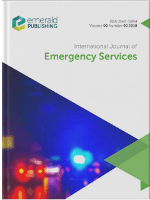
International Journal of Emergency Services
Exploring the forefront of emergency service management.The International Journal of Emergency Services, published by Emerald Group Publishing Ltd, is a pivotal resource in the fields of management science, operations research, and safety research. With its ISSN 2047-0894 and E-ISSN 2047-0908, this journal serves as a platform for innovative research and discourse from 2012 through to 2024. Recognized for its quality, it holds a Q3 ranking in both management and safety categories, demonstrating its commitment to advancing knowledge and practice in emergency services. The journal is particularly valued for its contributions to enhancing operational efficiency, promoting safety, and addressing the evolving challenges faced by emergency service professionals globally. It attracts a diverse readership comprising researchers, practitioners, and students keen to explore cutting-edge findings and methodologies. With access options tailored for academic and professional communities, the International Journal of Emergency Services remains an essential reference for those seeking to improve emergency response frameworks and strategies within the UK and beyond.
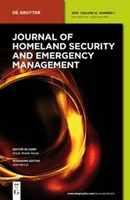
Journal of Homeland Security and Emergency Management
Transforming Knowledge into Action for Emergency PreparednessJournal of Homeland Security and Emergency Management, published by Walter de Gruyter GmbH in Germany, is a leading platform for scholarly research dedicated to the critical fields of security and emergency management. With an impressive impact factor reflecting its high-quality publications, this journal plays an essential role in advancing knowledge within its scope that covers vital issues such as disaster preparedness, risk assessment, and organizational resilience. The journal's Scopus rankings highlight its distinguished standing, being in the top quartile for Safety Research and demonstrating significant impact across various fields including Business Management and Safety, Risk, Reliability, and Quality. Researchers, professionals, and students alike can access a wealth of information as this open-access journal from 2004 to 2024 is committed to disseminating critical insights and innovative practices essential for effective homeland security and emergency management strategies.

Journal of Indian Geophysical Union
Exploring the Earth's Mysteries through Geophysical ResearchThe Journal of Indian Geophysical Union, published by the Indian Geophysical Union (IGU), serves as a vital platform for disseminating research in the field of geophysics. With the ISSN 0257-7968, this journal primarily focuses on studies related to geophysical sciences, including but not limited to, seismicity, environmental geophysics, and geodynamics, contributing to a better understanding of the Earth's processes. The journal is committed to quality research and aims to foster a collaborative environment for researchers, professionals, and students in India and internationally. Although currently not designated as an Open Access publication, it plays an essential role in connecting academia with practical applications in geophysical research. Based in Hyderabad, India, the Journal of Indian Geophysical Union continues to be an essential resource for those seeking to expand their knowledge and engage with the latest findings in geophysics.
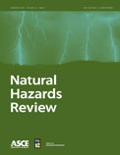
Natural Hazards Review
Fostering Innovation in Disaster Risk ReductionNatural Hazards Review, published by the ASCE-Amerc Soc Civil Engineers, is a prominent journal dedicated to advancing the understanding of the impacts of natural hazards on civil infrastructure, the environment, and societal dynamics. With a focus on interdisciplinary approaches, this journal plays a vital role in the fields of Civil and Structural Engineering, Environmental Science, and Social Sciences, evidenced by its Q2 rankings across multiple categories in 2023. Throughout its publication history since 2000, the journal has emerged as a key resource for researchers, practitioners, and students, providing innovative insights and fostering critical discussions regarding disaster risk reduction, resilience strategies, and sustainable practices. Although it does not currently offer open access options, authors and readers alike can benefit from its robust contributions as it continues to shape the discourse on mitigating the effects of natural hazards. By disseminating high-quality research, Natural Hazards Review is instrumental in promoting a comprehensive understanding of this pressing global issue.

Journal of Safety Science and Resilience
Exploring innovative solutions in safety science.Welcome to the Journal of Safety Science and Resilience, a pioneering platform dedicated to advancing knowledge in the fields of safety, risk, reliability, and quality. Published by KEAI PUBLISHING LTD and based in China, this Open Access journal has made significant strides since its inception in 2020. With an impressive impact factor and a distinguished Q1 ranking in various categories, including Safety Research and Safety, Risk, Reliability and Quality, it serves as an authoritative resource for researchers, professionals, and students alike. The journal's commitment to disseminating high-quality research is reflected in its exceptional Scopus rankings, with top positions in decision sciences and social sciences. As we converge into the future with volumes planned up to 2024, engaging contributions focused on contemporary challenges and innovations in safety science are more essential than ever. Explore groundbreaking studies and elevate your understanding of resilience in the face of uncertainty through this invaluable academic resource.
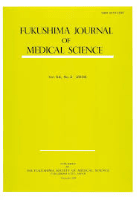
Fukushima Journal of Medical Science
Fostering Collaboration Across Medical SciencesFukushima Journal of Medical Science is a respected academic platform published by the Fukushima Society of Medical Science, focusing on a diverse array of topics within the field of medicine. With its roots tracing back to 1964, the journal has established a rich tradition of contributing to medical knowledge and remains a vital resource for researchers and professionals alike. Based in Japan, the journal holds a Q3 category ranking in Medicine (miscellaneous) as of 2023, showcasing its ongoing relevance and impact in the academic community. Although it currently does not offer open access options, its comprehensive content is accessible through institutional subscriptions. The journal's diverse rankings across multiple Scopus categories highlight its multidisciplinary approach, especially in areas such as Social Sciences and Phamaceutical Science, ensuring that it caters to a broad audience from various fields. The Fukushima Journal of Medical Science serves as an essential conduit for innovative research, collaboration, and professional development within its esteemed community, making it an invaluable asset for anyone invested in advancing the medical sciences.
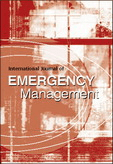
International Journal of Emergency Management
Advancing global strategies for effective emergency management.International Journal of Emergency Management is a reputable publication within the fields of emergency medicine and strategic management, published by InderScience Enterprises Ltd. With its ISSN 1471-4825 and E-ISSN 1741-5071, this journal has been a crucial platform for scholarly research since its inception in 2003. The journal aims to disseminate high-quality, peer-reviewed articles that address critical issues related to emergency management, including but not limited to disaster preparedness, response strategies, recovery methods, and risk assessment. Despite being categorized in Q4 of both emergency medicine and strategy and management in 2023, the journal serves as an essential resource for researchers, professionals, and students looking to further explore the evolving dynamics of emergency management. It leverages its global presence, with its headquarters located in the United Kingdom, thus attracting a diverse array of contributions addressing international and interdisciplinary perspectives. The journal fosters an environment where innovative ideas can flourish, ultimately contributing towards enhancing global emergency management practices.